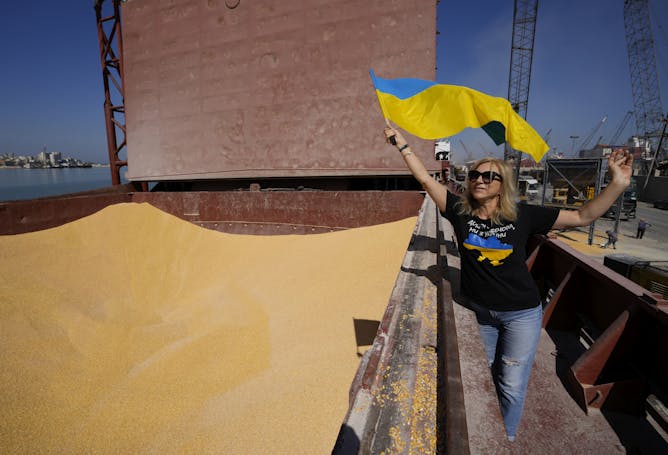|
Top headlines
Lead story
Global wheat and corn prices soared after Russia ripped up the grain deal it sealed with Ukraine a year ago and threatened to attack any ship in the Black Sea headed for a Ukrainian port. For good measure, Russia also pummeled Ukraine’s largest port, Odesa, with drones and missiles, destroying tens of thousands of tons of grains and critical infrastructure.
It wasn’t the first time Russia wanted to scrap the agreement, which has allowed Ukraine’s exports of wheat, corn and other foodstuffs to sail past Russia’s naval blockade to nations that desperately need them. But to Anna Nagurney, a supply chain expert at UMass Amherst and co-chair of the board of directors at the Kyiv School of Economics, this time feels different.
In today’s top story, she explains why Russia is backing out of the deal and why Odesa and other Ukrainian Black Sea ports are so important to feeding the world.
[Miss us on Sundays? Get a selection of our best and most popular stories (or try our other weekly emails).]
|

|
Bryan Keogh
Managing Editor
|
|

The grain deal allowed Ukrainian corn and other products to reach ports in Lebanon and elsewhere.
AP Photo/Hassan Ammar
Anna Nagurney, UMass Amherst
Russia’s move, which it followed by bombing the key port city of Odesa and threatening to attack any ship sailing for Ukraine, sent global food prices skyrocketing.
|
Environment + Energy
|
-
W. Larry Kenney, Penn State; Daniel Vecellio, Penn State; Rachel Cottle, Penn State; S. Tony Wolf, Penn State
The biggest risks aren’t always the biggest numbers on the thermometer – humidity gets dangerous faster than many people realize.
|
|
Economy + Business
|
-
Jason Miller, Michigan State University
Talks between the the International Brotherhood of Teamsters and company bosses have broken down. A supply chain expert explores what could happen next.
|
|
Science + Technology
|
-
Bruce Schneier, Harvard Kennedy School; Nathan Sanders, Harvard University
It’s difficult to see how artificial intelligence systems work, and to see whose interests they work for. Regulation could make AI more trustworthy. Until then, user beware.
-
Somin Lee, University of Michigan
Superresolution microscopy allowed researchers to view cells at the molecular level. Improvements on the technique can help study the building blocks of complex cell processes over time.
-
Jill Hollenbach, University of California, San Francisco; Danillo Augusto, University of North Carolina – Charlotte
Researchers found that people with a specific gene variant were two to eight times more likely to not have symptoms after infection.
|
|
Politics + Society
|
-
Gibbs Knotts, College of Charleston; Christopher A. Cooper, Western Carolina University
The National Defense Authorization Act has long had bipartisan support in both houses of Congress. But that died in the House this year.
-
Nicole Cooke, University of South Carolina
Librarians are defending the rights of readers and writers in the battle raging across the US over censorship, book challenges and book bans. That conflict has even changed how librarians are trained.
-
Lorna Grisby, The Conversation
Michigan’s attorney general has charged 16 people in a fake electors plot to overturn the 2020 presidential election. Here’s how the Electoral College works.
|
|
Health + Medicine
|
-
Geoffrey Joyce, University of Southern California
The shortages, which have been going on for years, have typically affected only low-cost generics rather than profitable brand-name drugs.
|
|
Arts + Culture
|
-
Janet Echelman, Massachusetts Institute of Technology (MIT)
Artist Janet Echelman explains how she collaborates with engineers to create massive sculptures that have changed city landscapes and inspired people around the world.
|
|
|
|
Today's graphic / Reader Comments 💬 |
|---|
| |
|
| |
| |
| |
| |
|
|